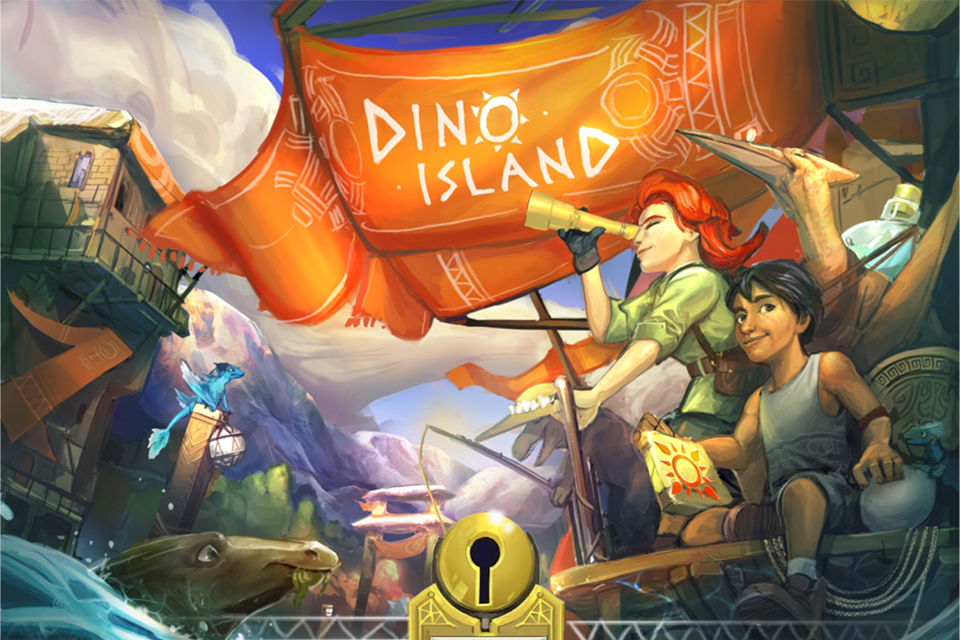Dino
island
*Signups for the current clinical trial are paused, but please complete the form below to join our waitlist. We will contact you when registration resumes.
Overview
Dino Island (DI) is a cognitive intervention designed to improve children’s attention and executive function (EF). The DI tablet-based game consists of five ‘serious games,’ each designed for a specific therapeutic purpose while incorporating the look and feel of a video game to motivate children. The unique self-adjusting design of the program means that games automatically adapt to the appropriate difficulty level for each child.
The Dino Island intervention program combines the appeal of tablet-based gaming with the effectiveness of an in-person, interventionist-child structure. Interventionists (i.e. parents or educational assistants) receive online training consisting of specific lessons on effectively teaching problem-solving strategies to children. Children can deploy these strategies in real time while playing the game, with the aim of mastering these concepts and, in time, using them independently in their daily lives.
Dino Island (DI) is a cognitive intervention designed to improve attention and EF abilities in children, which combines the appeal of tablet-based gaming with the effectiveness of an in-person, interventionist-child structure. Dino Island represents the latest iteration in a long-line of validated cognitive interventions based on neuroscientific approaches to rehabilitation/habilitation of cognitive abilities.
The previous iteration of Dino Island (Carribean Quest) when delivered in schools by support workers, led to gains in children in attention and executive functions, which were seen in their daily lives in the areas of self-regulation, self-monitoring, metacognitive awareness, and academic fluency.
DI was developed with the specific goals of being effective, affordable, and accessible to for all children and families. The unique self-adjusting design enables the program to automatically stay at the appropriate difficulty level for each specific child, while the platform’s game format fosters ongoing child engagement.
A companion website provides ‘interventionist’ training that is tailored to non- professionals (e.g., parents, teachers, support workers) by introducing evidence-based strategies for teaching problem-solving techniques (i.e., ‘metacognitive strategies’) to children, which helps generalize the target skills to other areas of the child’s life (e.g., classroom, home, peer interactions). This training program provides new knowledge and skills in the interventionist to support children with NDDs. It also builds capacity within community systems by reducing the need for specialized health and education professionals.
DI is designed with the goal of permitting remote and/or resource-limited communities to address needs that might otherwise go unmet, thus reducing burdens upon individuals, families, and broader systems. Dino Island is currently undergoing clinical validation research with a range of different children and families across Canada. Because Dino Island mainly targets the areas of attention and EF, each of these areas is briefly described below. Through this intervention, these key areas are improved as children learn and practice new skills, taking advantage of the brain’s ability to change and improve over time, a concept known as ‘neuroplasticity.’
The Dino Island intervention program consists of five ‘serious games,’ meaning that they are designed for a therapeutic purpose (i.e., improving attention and EF), but incorporate the look and feel of a video game to help interest and motivate children. Each of the games focus on various aspects of attention and EF, progressively becoming more difficult as children succeed. As children begin to struggle with more difficult task/game demands, the program automatically adjusts to make sure that children do not become overly discouraged.
Interventionists (i.e. parents, educational assistants, etc.) receive online training that provides a foundational understanding of cognitive intervention, including specific lessons on how to effectively teach/scaffold problem-solving strategies so that children will eventually master the concepts and be able to use them independently in their daily lives.
Attention and Executive Functions
Executive Functions
Executive functions are what allow a child to make and pursue goals in their daily lives. This includes the abilities to resist impulsive actions (‘inhibition’), to adjust to unexpected changes (flexibility and creative problem solving), and to stay focused on the task at hand (i.e., self-control).
Working Memory is what allows a person to hold important/relevant information in mind long enough to complete a task. For example, dialing a number while being distracted or working with the information while adding numbers up in your head both require working memory.
Attention
Attention includes abilities such as staying focused on something important (i.e., ‘sustained attention’), shifting attention from one task/item to another, and dividing attention between different tasks, etc.
Why are attention and executive functions important?
Attention and Executive Functions (EF) are important for self-control, self-regulation, flexibility, perseverance, school/work success, making/keeping friends, and mental/psychological health. Attention and EF problems are common in children for a variety of reasons, and failure to address these concerns may lead to long term difficulties with learning, health, and quality of life. While a number of cognitive training programs have sought to address these needs, those currently available have been shown to be ineffective, expensive, and/or inaccessible to those in remote communities or without access to specialized professionals.
See Dino island in action.
Dino Island Contact Form

